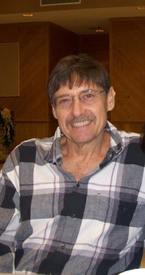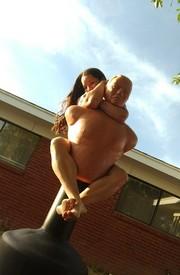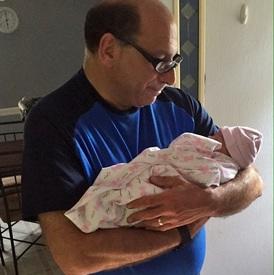Did I really burn that many calories???

numinousnymph
Posts: 249 Member
Today I went on a long hike, 8 miles in about 4.5 hours. It was not very strenuous of a path -- I would say half of it was relatively flat and half of it was either uphill or downhill. I wasn't carrying anything except my water bottle, and some of it got my heart rate up and breathing hard, but that was probably only 1/6 of the whole hike. I'm 23, 5' 4", weigh 128 lbs. Even when I put in the option on MFP that I walked for 4.5 hours at 2 mph, it still says I burned 656 calories! To me that is a whole lot, even though I know I was walking for around 4.25 hours (took maybe a total of 15 minutes of breaks). And when I put in the hiking option, it's ridiculous! Even if I put in that I did an hour of hiking carrying less than 10 lbs it says I burned 414 calories. I just can't believe that either of those are true, and so I'm just really confused as to what to say my exercise was for today. Anyone have any help?
0
Replies
-
It's probably over estimating. That is a pretty big calorie burn for a person who doesn't weigh a lot.0
-
MFP cals are always waaaay over for me. I wear a HRM when I want a more accurate calculation.0
-
Anyone have any idea of about how much it's overestimating?0
-
Anyone have any idea of about how much it's overestimating?
You probably burned a few hundred calories. Have you considered switching to the TDEE - 20% method so this isn't an issue?0 -
No idea. FYI, MFP often estimates below what my HRM tells me but I'm 6'2", 250 lbs.0
-
I would say it is pretty close to being right @ the 2 mph option. {255 minutes is a long workout} I think the hiking numbers are higher because it is across uneven ground, over downed trees and the like. Walking on a path is less work than going cross country. I know when I walk in the woods it is harder. But there are lots of calorie burned calculators out there. Punch your numbers into a couple different ones and see what they say.
Larro0 -
Anyone have any idea of about how much it's overestimating?
You probably burned a few hundred calories. Have you considered switching to the TDEE - 20% method so this isn't an issue?
Do you mean calculate my TDEE, minus 20% from it and then try to net that calorie level? How does figuring out how many calories I burned from this exercise fit in there? I'm sorry, I don't know much about that method 0
0 -
Anyone have any idea of about how much it's overestimating?
You probably burned a few hundred calories. Have you considered switching to the TDEE - 20% method so this isn't an issue?
Do you mean calculate my TDEE, minus 20% from it and then try to net that calorie level? How does the exercise fit in there? I'm sorry, I don't know much about that method
When you calculate TDEE, you include exercise into the equation. You cut 20% (your deficit) from that and eat the same calories per day. So exercise is already built in. Other options are to use a TDEE calculator or just change your activity level in MFP to include exercise. What many people will do to record exercise is change calories burned to "1" so they still document their exercise.
For example, if you exercise 3 to 4 hours a week, change your account to lightly active, or active for 5 to 6 hours of exercise. After 1 month of tracking daily, you can figure out your real TDEE.
I average 2500 calories a day, I also average 1 lb per week fairly consistently (over a 12 week period), so I know my average TDEE is 3000 calories (or my maintenance calories). Some days I burn more, some less but it all equals out over a week.0 -
The walking seems pretty accurate! If you think about it, on average, a person burns 120 calories an hour just from standing (I read it on a fitness website once!), so walking for four and a half hours probably burns more than you think! I always use a tracker on my phone where you can enter your weight and the type of exercise and usually it is pretty accurate!0
-
Remember that you burn calories just by existing.0
-
I've heard to estimate roughly 100 calories per mile for walking... But that's just something I've heard.
Basically, I have nothing helpful to add whatsoever.0 -
I agree with what most people have said. Hikes are tougher on our bodies than we realize, I imagine because it's not all flat ground like asphalt typically is. When wifey and I do a hike for, say, 1.5-2 hours, I burn a crazy, crazy, crazy ton of calories and I'm carrying nothing. Granted, I weight 70 lbs. more than you do, but I'd bet the estimates on MFP are pretty close. If in doubt, shave off 150-300 calories if it makes you feel better, but don't shortchange yourself too much. Ya' gotta eat!0
-
I wear my hrm when I hike and at 5' 120 lbs, the mfp default estimate is usually slightly lower than my hrm. My HR is usually 150ish on the way up and 120-130 on the way down. I carry nothing.0
-
Anyone have any idea of about how much it's overestimating?
You probably burned a few hundred calories. Have you considered switching to the TDEE - 20% method so this isn't an issue?
Do you mean calculate my TDEE, minus 20% from it and then try to net that calorie level? How does the exercise fit in there? I'm sorry, I don't know much about that method
When you calculate TDEE, you include exercise into the equation. You cut 20% (your deficit) from that and eat the same calories per day. So exercise is already built in. Other options are to use a TDEE calculator or just change your activity level in MFP to include exercise. What many people will do to record exercise is change calories burned to "1" so they still document their exercise.
For example, if you exercise 3 to 4 hours a week, change your account to lightly active, or active for 5 to 6 hours of exercise. After 1 month of tracking daily, you can figure out your real TDEE.
I average 2500 calories a day, I also average 1 lb per week fairly consistently (over a 12 week period), so I know my average TDEE is 3000 calories (or my maintenance calories). Some days I burn more, some less but it all equals out over a week.
This is easiest for me. If it doesn't work for you, try using around 50% of what MFP says you burned. I found this site overestimates by quite a lot.0 -
I've noticed that MFP is about 50-100 over what I actually burn (I have a HRM to tell me "exactly") but Its estimated that you'll burned about 100 calories per mile - so it might be somewhat true ...0
-
600+ calories on an 8 mile hike is entirely possible.0
-
For hiking, try this one ... http://hikingscience.blogspot.com/p/calculate-calories-burned_22.html0
-
If you want to know the number because you are eating back calories, I would go with half the MFP number and if you feel it wasn't strenuous then use the walking number, not the hiking number.0
-
I've noticed that MFP is about 50-100 over what I actually burn (I have a HRM to tell me "exactly") but Its estimated that you'll burned about 100 calories per mile - so it might be somewhat true ...
HRM's are not exact either. They only calculate steady state cardio (so only the time you are 'in the zone') All calorie burn methods are purely estimates.0 -
Seems about right to me if not even a bit low. I am hard pressed to find a calculator that doesn't show 800 as a guess for 270 minutes of slow walking.0
-
Sounds more like a net burn, but in 4.5 hours, you would have probably burned around 300-400 calories just by sitting on your butt. Taking that from the number MFP gave you and you probably will get a more realistic number. (200-300 cals)0
-
Also, remember that Calories are a metric of energy used.
1 calorie is the energy required to heat 1 gram of water by 1 degree
so food can be burned (literally) and how much water it heats up by 1 degree is the number of calories.
Now change that for exercise and the metric is guestimation at best.
lets take an apple at 80 calories (for example) that means that when set on fire an apple can heat 80 grams fo water by 1 degree.
Now if one apple means you can walk for 1 hour then you know you burn 80 calories per hour whilst walking but without doing extreme starvation testing you couldnt test this and so many other factors come into play.
if you ate 5000 calories and then did 5000 calories "worth of exercise" you wouldnt drop dead..
a good rule of thumb is knock off 20% of the speculative calorie counts.
or dont count exercise.0 -
it doesn't seem that extreme honestly- walking around for almost 5 hours is work- even if you aren't working exceptionally hard.
I rarely put in my full time working out- I throttle it back to what seems to be a more appropriate number- like if I put in 2 hours for dance- it would have me burning upwards 4-500- and I know it's not that much- so I'll usually put in 45 min- gives me 3-400 which is much more reasonable- then I eat back 50-75% of that.
Over estimating workouts and underestimating food gets people into trouble- a lot- it's a very common problem.
Over estimate food and underestimate workouts- will help push you more toward a deficit-0 -
Sounds about right for the amount of time you were active.0
-
If I walk/run for an hour (avg. pace 4.5 mph) I burn close to 650 calories according to my HRM at 5'4" and 179 lbs. I'd say it's pretty accurate for how many calories you burned during the total of that period. BUT, because some of those are "Existence" calories, I'd say log half that amount.
FWIW I only log 70% of my calories because I'd much rather under-estimate my calories than over-estimate.0 -
Over estimating workouts and underestimating food gets people into trouble- a lot- it's a very common problem.
Over estimate food and underestimate workouts- will help push you more toward a deficit-
This! Most people don't realize that many of the calorie burns an HRM calculation yields may have otherwise been burned regardless of how strenuous a particular activity is stated to be. If you didn't break into a heavy sweat during that exercise, it wasn't a high-energy cardio excercise that burned up fat calories. So consider that exercise to be only normal day-to-day activity rather than true exercise that yields an honest calorie burn. As you become more fit, your resting heart rate will drop somewhat over time and make it more challenging for you to reach your magic fat burning zone. As a result, your actual calorie burn from any cardio fitness activity you do diminishes as you become more aerobically fit over time. The true long-term purpose of cardio is to strengthen your heart, not burn up fat.
Also, be aware that body building exercises do not typically yield large calorie burns but they result in development of stronger and leaner muscle tissue that impacts TDEE. Developing your largest muscle groups will impact your TDEE significantly more in the long term than any single cardio exercise will. This is because muscle tissue consumes lots of energy even at rest while fat does not consume energy. In fact, fat is stored energy waiting to be consumed upon demand. Build your largest muscle groups to increase that energy demand.0
This discussion has been closed.
Categories
- All Categories
- 1.4M Health, Wellness and Goals
- 398.1K Introduce Yourself
- 44.7K Getting Started
- 261K Health and Weight Loss
- 176.4K Food and Nutrition
- 47.7K Recipes
- 233K Fitness and Exercise
- 462 Sleep, Mindfulness and Overall Wellness
- 6.5K Goal: Maintaining Weight
- 8.7K Goal: Gaining Weight and Body Building
- 153.5K Motivation and Support
- 8.4K Challenges
- 1.4K Debate Club
- 96.5K Chit-Chat
- 2.6K Fun and Games
- 4.8K MyFitnessPal Information
- 18 News and Announcements
- 21 MyFitnessPal Academy
- 1.5K Feature Suggestions and Ideas
- 3.2K MyFitnessPal Tech Support Questions


















